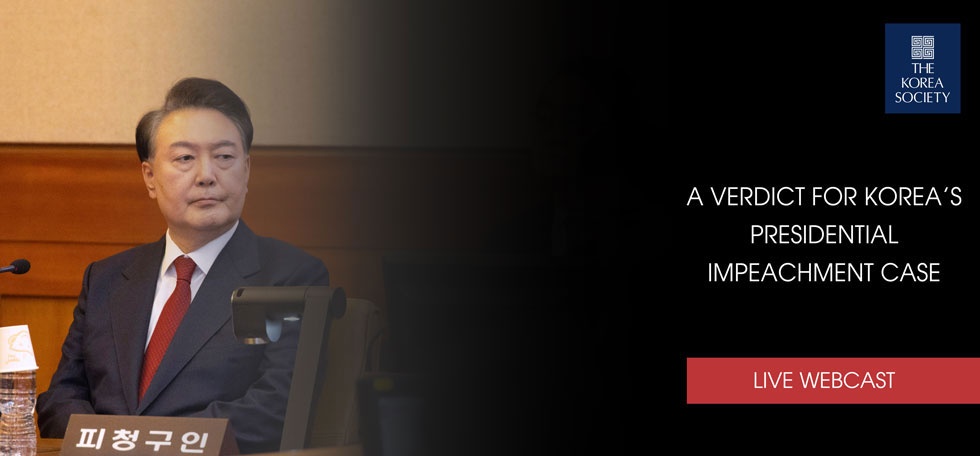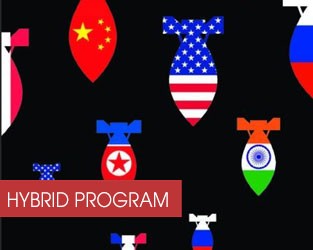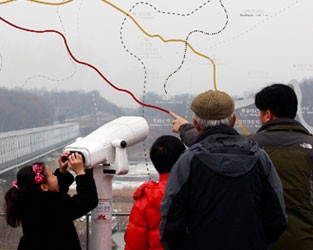![]() The Korea Society’s Dr. Stephen Noerper interviews Scott Thomas Bruce of CRDF Global on the Google’s Executive Chairman Eric Schmidt’s recent trip to North Korea. Mr. Bruce discusses the significance of Eric Schmidt’s visit, the implications of North Korea’s possible opening to information technology, opportunities for NGOs to engage with the the DPRK, and future potential inter-Korean cooperation in the field of information technology.
The Korea Society’s Dr. Stephen Noerper interviews Scott Thomas Bruce of CRDF Global on the Google’s Executive Chairman Eric Schmidt’s recent trip to North Korea. Mr. Bruce discusses the significance of Eric Schmidt’s visit, the implications of North Korea’s possible opening to information technology, opportunities for NGOs to engage with the the DPRK, and future potential inter-Korean cooperation in the field of information technology.
Googling North Korea
Podcast
Googling North Korea
Thursday, January 10, 2013
SPEAKER:
Scott Thomas Bruce
Project Manager for the Partnership for Nuclear Security at CRDF Global
Moderated by
Stephen Noerper
Senior Vice President, The Korea Society
STEPHEN NOERPER (Moderator):
Welcome to Studio Korea and welcome to The Korea Society.
Google Executive Chairman Eric Schmidt, former Governor of New Mexico Bill Richardson, and Jared Cohen of Google Ideas returned from a four-day visit to North Korea. While at Beijing Airport on January 10, Schmidt is quoted as saying:
"As the world becomes increasingly connected, [North Korea's] decision to be virtually isolated is very much going to affect their physical world, their economic growth, and so forth; and it will make it harder for them to catch up economically...We made that alternative very, very clear."
Speaking with us today is Scott Thomas Bruce, Project Manager of the Partnership for Nuclear Security at CRDF Global. In addition to his role at CRDF Global, Scott is an associate at the Nautilus Institute and the East-West Center. Scott is a specialist in non-proliferation and East Asian security issues, and author of AsiaPacific Issues, Brief No. 105 (October, 2012) by the East-West Center, "A Double-Edged Sword: Information Technology in North Korea." Scott is here to help us analyze the "Google visit,” as it's referred to by the North Koreans. Scott, welcome to Studio Korea. What is your take on the Google visit?
SCOTT THOMAS BRUCE:
Well, I think it's a very significant visit. I do not expect Google to be opening a Pyongyang office anytime soon, but I think the message that Eric Schmidt sent to North Korea is very important.
Currently, one of North Korea's biggest priorities is to attract foreign direct investment as part of its plan to build a stronger and more prosperous country. The number one complaint from investors doing business there (including the Chinese) is that you can't bring a cell phone to North Korea, and you're can't access the Internet at all. Mr. Schmidt was in a unique position to deliver the message that by closing down the Internet, not allowing mobile phones, and restricting the use of information technology; North Korea is impeding its own ability to attract foreign investment, and therefore build a more robust economy.
STEPHEN NOERPER:
How does that sync with the New Year's message of Kim Jong-un emphasizing the development of North Korea's science and technology sectors? And how has the visit been represented by the North Korean media?
SCOTT THOMAS BRUCE:
The visit has been played out in North Korea as a showcase; as a great opportunity. Look at these groups from the outside world coming here. They took Mr. Schmidt to some of the universities in order to show him how North Korea uses an "Intranet" and other information technology systems. Of course, these systems are not nearly as widespread as they were projected to be.
However, we should consider this in the broader context of North Korea's current goals. Last year Kim Jong-un stated that he wanted North Korea using tools such as the Internet in order to seek development information from the rest of the world. The biggest priority mentioned in the New Year's address was development of the economy and the science and technology sectors.
The use of information technology is very much in line with North Korea's goals. The important thing to remember, though, is that North Korea's main concern remains control over the domestic population. That means making sure North Koreans have as little information as possible about the outside world, as that information is considered to be corrosive. The North is walking a tightrope between its attempt to leverage information technology (particularly cell phones, which have really expanded there in the last five years) and its desire to maintain control over its population while preventing any sort of outside media coming in and having a disruptive impact on its population.
STEPHEN NOERPER:
Just what type of access does the average North Korean have to either the Intranet or mobile phones?
SCOTT THOMAS BRUCE:
A North Korean defector published a couple of papers on the subject, and he stated that North Korea doesn't have an Internet. It has a "mosquito net." It has a system that is designed to allow access to certain materials to a very privileged elite, but its main goal is to protect its population from potentially corrosive foreign information.
If you're wealthy, you might be able to afford a Koryolink mobile phone. These phones can only make calls within North Korea. If you're a student or part of an even more elite class, you might have access to the North Korean Intranet, which is a closed network. It's not like the Internet we know. It's populated with documents that have been approved by the North Korean government. Its message boards and bulletin boards are very closely monitored by North Korean authorities.
What the North Koreans have done is created a system where the population that has access to information technology, cell phones, and the Intranet are the most wealthy and the most elite within North Korea. The regime is calculating that the wealthiest members of the population have the biggest stake in the survival of the state as it exists today. They're making sure that those who have access to this technology are those that would be the least likely to use it to undermine the regime at any point in time.
STEPHEN NOERPER:
Interesting. In your brief published last October, you referred to the burgeoning interest in information technology by the North Korean state as a "double-edged sword." What degree of risk is there to opening up North Korea? Can you identify a critical point where the free flow of information will become a challenge to the regime?
SCOTT THOMAS BRUCE:
Absolutely. We're already seeing changes. The availability of cell phone networks along with the Intranet (even if they can only be used domestically) are very new developments in North Korea. One of the interesting things we discovered is that those North Koreans who do have cell phones (which is about 5 percent of the country and about 1 million people out of a population of 20 to 22 million) use their phones as much as their cousins in South Korea. It's just that a much smaller percentage of the North Korean population has that access.
This means there are far more conversations being held in North Korea than the state security mechanism can track at this stage. That's a very new development. Traditionally, the State Security Department was able to keep track of every conversation being held on landlines in the North. Secondly, the development of the Intranet is turning North Koreans into consumers of information. They're going "online" looking for information they can use. This is a very big shift for a population that has been trained over many decades to not ask questions and not draw attention to themselves.
We are seeing a systematic shift in North Korea. At the same time, these technologies are being adopted in a country that has one of the most rigid social hierarchies of any country on earth. You basically have a caste system where social welfare provision of good jobs, access to health care, and access to education is tightly controlled—only available to those who are considered good citizens and denied to those who have a negative history within the country. So, it's very limited in terms of who's going to have access to it, and the social control mechanisms are very rigid.
We're not looking at a situation that's going to lead inevitably to some sort of Jasmine Revolution within North Korea; but we are seeing seeds that have been planted within the North that over a very long period of time (perhaps a decade or so) could have a potentially transformative impact on the state.
STEPHEN NOERPER:
Eric Schmidt, the Executive Chairman of Google, made note of the fact that Orascom, the Egyptian company, was able to put a million cell phones in the hands of North Korean users (one would think mainly in the Pyongyang area) and questioned why that couldn't lead to the use of the Internet. He also made note that the remaining 23 million North Koreans did not have access to the Internet. Supposedly, Google has been invited for return visits. What do you make of his observation that the majority of the population doesn't have access to the Internet? What opportunity do you think lies ahead for Google and other companies to engage with North Korea to provide information technology?
SCOTT THOMAS BRUCE:
Well, I think there is now an open door for companies like Google to engage with North Korea, noting that it has to be in line with the goals of the regime. Working with the North is business diplomacy on behalf of Google. In terms of the availability of access, the North Koreans will allow greater access to the Internet and information technology to the extent they believe they can control its impact on the population.
What you saw at a certain point was a picture of the head of Orascom meeting with Kim Jong-il (who was alive at the time) and in the background was the head of the State Security Department. The meaning behind that picture was that the state security mechanism had blessed the introduction of mobile phones into North Korea. They wouldn't have done that unless they believed they could control their impact.
So, there is potential to expand the use of this technology, and North Korea is certainly interested in that. It would provide productivity gains for the state. It could also be a tool for bringing in foreign direct investment from the outside world. Most importantly, it could be a blessing—a domestic system where government controls can be used to crack down on some of the rogue systems using Chinese cell phones near the border. This is becoming a problem in the North. That being said, these systems are only going to be allowed in the North as long as the North believes it can control the repercussions of these systems on its population. We really have to moderate our expectations as to how much the North can do.
I think there's also opportunity here (since the use of the Internet has been blessed by the North Koreans as a way of bringing in information about development) for NGOs and others to try and engage with these groups in the North. It gives them the ability to feed relevant development information into the system; and to try and engage the North through research education networks, virtual science libraries, and other tools that would allow the North to control access to this technology. NGOs could build on the use of it within the North to possibly help steer the North in a positive direction developmentally. That would hopefully lead to better relations with the outside world that would be seen as more of an incentive than a threat to the regime.
STEPHEN NOERPER:
I have one final question, Scott. We have both the least wired and the most wired countries in the world sharing the Demilitarized Zone. Do you see the potential for North-South cooperation, especially with the incoming Park Geun-hye administration? Is the potential to share information technology between Pyongyang and Seoul through her suggestion of liaison offices a possibility?
SCOTT THOMAS BRUCE:
I believe there is an opportunity to explore whether North-South cooperation is possible under a new government in the South. It remains to be seen what sort of traction that's going to get; but there's been many ideas along this line that have been explored in the past.
One idea was that of virtual family reunions. Many families have been divided between the North and the South for sixty years. Were there to be some way to set up video conferences or something similar at controlled locations between the North and the South, that would be a tremendous opportunity for these divided families; one that would be very meaningful to the Korean people on both sides of the border.
It also opens up the possibility for the South to consider outsourcing IT to North Korea. They speak a common language, are fairly close geographically, and the cost of labor in the North would be very affordable. So, there's a lot of grounds that could be built upon in terms of IT cooperation and inter-Korean relations. It just remains to be seen what sort of traction they're going to have, and how much will be encouraged in the midst of so many other issues on the agenda between the North and the South, such as the divided maritime boundaries, the nuclear program, and rocket launches.
STEPHEN NOERPER:
Scott Thomas Bruce of CRDF Global, thank you very much.
SCOTT THOMAS BRUCE:
My pleasure.
- <
- itms://itunes.apple.com/us/podcast/corporate-views-on-korea-from/id210903888?i=128122039#
- About the Speaker
- http://traffic.libsyn.com/koreasociety/2013-01-10-DPRK-Google-Visit.mp3











